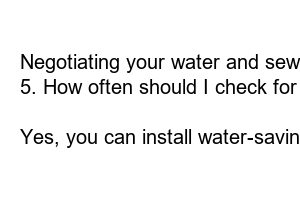상하수도 요금 조회
Title: Everything You Need to Know About Water and Sewerage Bill Inquiry
Introduction:
Water and sewerage bills are a common part of our monthly expenses, but understanding the charges and making inquiries can sometimes be confusing. In this blog post, we will provide a comprehensive guide to help you navigate through your water and sewerage bill inquiries easily.
1. Why is Understanding Your Water and Sewerage Bill Important?
Understanding your water and sewerage bill is crucial to ensure accurate billing, detect any discrepancies, and manage your finances effectively. By knowing what each charge represents, you can take steps to conserve water and reduce your monthly expenses.
2. Key Components of a Water and Sewerage Bill:
Your water and sewerage bill may consist of several components, including water supply charges, wastewater charges, and service fees. Water supply charges are applicable for the amount of water you use, while wastewater charges are based on the volume of wastewater generated. Service fees encompass various costs associated with meter reading, maintenance, and administrative charges.
3. How to Read Your Water and Sewerage Bill:
To read your water and sewerage bill, look for the detailed breakdown of charges, consumption details, and meter readings. It is important to thoroughly review these sections, cross-checking them with your monthly usage, to ensure accurate billing.
4. Common Reasons for Discrepancies in Your Water and Sewerage Bill:
Discrepancies in water and sewerage bills can occur due to various reasons, such as faulty meter readings, leaks in the water system, or erroneous calculations. If you notice any discrepancies, it is essential to contact your water provider promptly to clarify the issue and seek resolution.
5. How to Inquire About Your Water and Sewerage Bill:
Inquiring about your water and sewerage bill is easy and can be done through multiple channels, including online portals, phone calls, or visiting the service provider’s office. Provide them with the necessary details, such as your account number and the specific inquiries you have, to receive accurate and timely responses.
6. Tips to Reduce Your Water and Sewerage Bill:
Reducing your water and sewerage bill not only helps you save money but also contributes to environmental conservation. Implementing simple practices like fixing leaks promptly, installing water-saving devices, and practicing conscious water usage can make a significant difference in reducing your monthly expenses.
Summary:
Understanding your water and sewerage bill is essential for accurate billing and effective financial management. By familiarizing yourself with the components of the bill, reading it thoroughly, and addressing any discrepancies promptly, you can ensure accurate charges. Inquiring about your bill and implementing water-saving practices will contribute to reduced expenses. Stay mindful of your water usage, conserve water, and maintain a healthy balance between financial prudence and environmental responsibility.
FAQs:
1. What should I do if I notice a significant increase in my water and sewerage bill?
If you notice a significant increase in your water and sewerage bill without any apparent cause, check for leaks, ensure accurate meter readings, and consult your water provider for further investigation.
2. Can I dispute my water and sewerage bill?
Yes, if you believe that there is an error in your water and sewerage bill, you have the right to dispute it. Contact your water service provider with the specific details, and they will guide you through the dispute resolution process.
3. Can I access my water and sewerage bill online?
Many water service providers offer online portals where you can access and manage your water and sewerage bill. Check with your provider to see if this option is available.
4. Can I negotiate my water and sewerage bill?
Negotiating your water and sewerage bill may not be possible as charges are typically predetermined and based on your consumption. However, it is always worth discussing any significant changes or issues with your water service provider.
5. How often should I check for leaks in my water system?
It is advisable to check for leaks in your water system periodically. Conducting regular inspections can help identify and resolve leaks early, preventing unnecessary water wastage and high bills.
6. Can I install water-saving devices myself?
Yes, you can install water-saving devices, such as low-flow showerheads or faucet aerators, yourself. However, for more complex installations, it is recommended to consult a professional plumber.

